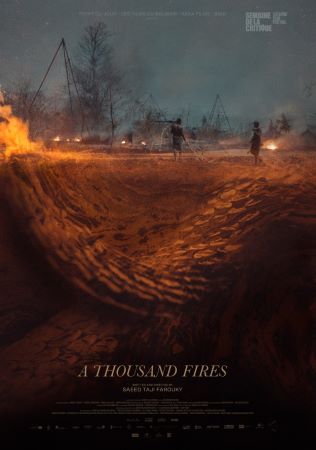
A Thousand Fires 2021
Distributed by Documentary Educational Resources, 108 Water Street, 5A, Watertown, MA 02472; 617-926-0491
Produced by Estelle Robin You
Directed by Saeed Taji Forouky
Streaming, 90 mins
College - General Adult
Anthropology; Film Studies; Rural Sociology; Southeast Asian Studies
Date Entered: 03/20/2024
Reviewed by Michael Pasqualoni, Librarian for Public Communications, Syracuse University LibrariesA Thousand Fires is the first full-length documentary film from Palestinian-British filmmaker and educator, Saeed Taji Farouky. In film festival interview commentary, Saeed has pointed to his inspirations including creators of slow observational cinema, and while seemingly counterintuitive, an early desire to render his own documentary approach to an oil drilling and family tale akin to what Paul Thomas Anderson created in his 2007 Hollywood feature film, There Will Be Blood (DOK.fest München, 2022). But in this case, actions set in a rural village in an oil producing region of Myanmar. Techniques one sees for individual oil drilling in the film resemble some of the earliest used when that industry was first emerging.
A Thousand Fires at its heart is a tale of Thein Shwe, patriarch of one Burmese family. We have a personal introduction that is frequently though not always wordless, showing that family’s rural working-class rhythms, religious life, raising of children, and attending to health and livelihoods inside starkly modest economic circumstances. Lovely choices include the use of a brooding musical score by the one-woman Swiss multi-instrumentalist, Fatima Dunn. Music and image, and particularly the continual bubbling ooze of fossil fuels, provides an otherwise excellent, if not paradoxical, contrast between the calm rigors and joy the family brings to their daily struggles and celebrations, and a transient nature of life on the planet. Mortality is a character here. Rarely in a film has one gotten to know a family as well with so little spoken dialogue.
Farouky eschews placing plot points at the center for a film aiming to spark a felt response. This succeeds in providing viewers glimpses of work and family that have cross-cultural resonance. A bit less successful is that the close-ups may be a tad bit overused at times, the filmmaker possibly too much in love with that specific filmic voyeurism. Some points of view of those besides the father also get relatively short shrift.
Elemental forces just off-stage erupting as geysers of liquid and fire are another member of the cast. These reminders of fragility, linked with much one does not control, intersect with cycles of work and sleep in the film. This all parallels scenes of fortune telling, prayer, and the roles of reincarnation in Buddhist belief. Gentle visual hints of banishment from paradise hang off of some of the cinematography, which in the literal socioeconomic context of Myanmar resides above ground in the form of that country’s sharp income inequality. One hears hints from our central character of governments good and bad that impacted his youth. Following this film’s release, the quest for football (soccer) fame documented here for son, Zin Ko Aung, as his possible ticket to new opportunities beyond a life dominated by agriculture and oil drilling, would ultimately collide with a violent coup in early 2021 bringing a military takeover of the government.
A Thousand Fires is a recommended film, but with limited reservations connected to uncertainty regarding how wide would be its audience inside of academic or other educational environments. The strongest embrace is most probable within anthropology or rural sociology, and surely within film studies itself. Possible interest too resides in Southeast Asian studies and perhaps even labor studies. Its laudable and human centered focus on emphasizing emotion over informational facts, a non-linear structure, and associated cyclical images, may run contrary to some elements of academe in western nation contexts, when those cultivate at times precisely the opposite aesthetic and goals. Appropriate adoption of this moving documentary film title rests primarily on knowing that it shall be an experience in slow cinema (Kuhn & Westwell, 2020) and focused on affective responses and not a harvest of quantitative data.
References:
Awards:Winner Marco Zucchi Award Locarno Film Festival, Switzerland, 2021
Published and licensed under the Creative Commons Attribution 4.0 license. Anyone can use these reviews, so long as they comply with the terms of the license.